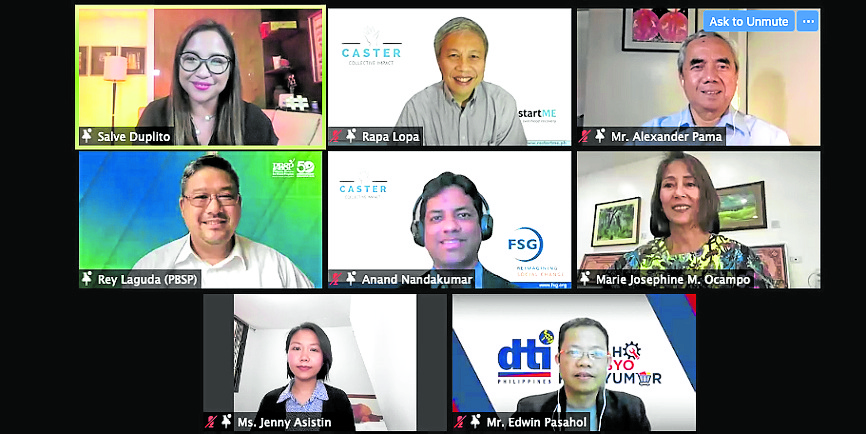Small PH enterprises win a lifeline

Upper left: Salve Duplito leads the panel discussion during the public launch of Project Caster scoping study together with Rapa Lopa, RestartME president; Alexander Pama, Arise Philippines, Inc. cochair; Reynaldo Antonio Laguda, PBSP president; Anand Nandakumar, FSG Senior Advisor; Marie Josephine Ocampo, EVP of BPI; Jenny Asistin, BSP Strategic Communication and Advocacy Bank Officer; and Edwin Pasahol, of DTI-BSMED. —CONTRIBUTED PHOTO
It may take not just a village but collective institutional action to help local micro, small and medium enterprises (MSMEs) and microfinance institutions (MFIs) overcome unprecedented challenges arising from the COVID-19 pandemic. One silver lining is the growing digital connectivity that is helping more of these small players adapt to the “next” normal.
This is according to the Collective Action Secretariat to Enhance Resilience among MFIs and MSMEs (Caster) scoping study made by local nongovernment organization Restart Microenterprise Inc. (RestartME), together with FSG Inc.
Supported by a research grant from BPI Foundation and technical assistance from BPI BanKo, the Caster project evaluated opportunities, challenges and solutions that could boost the business recovery efforts of MSMEs and MFIs.
Conducted from November 2020 to January 2021, Caster evaluated the end-to-end business impact of the COVID-19 pandemic on MSMEs and identified solutions to assist them amid these challenging times. It found online marketing and e-commerce as the most common starting points for MSMEs in embracing digitalization.
“The extent of financial tech adoption recently shows how a significant number of MSMEs are flexible enough to embrace innovation. But with institutional support, they can take these digital solutions even further,” said RestartME executive director Aika Robredo.
The study identified MSMEs under “food and nonfood” as those that lead the use of online platforms such as online marketplaces Shopee and Lazada. Same-day delivery services such as Grab and Foodpanda are also increasingly being harnessed by restaurants, groceries and stores to extend their delivery services. Caster likewise noted increased use of digital payment channels and mobile wallets such as G-Cash and Paymaya. It explained that these digital payment collections and transfers are “gaining traction due to the increased adoption among users, although concerns on fraud would still make cash the primary preference.”
But while digital connectivity has picked up pace, the study showed that most of the surveyed neighborhood sari-sari stores, small carinderias and market stall owners still prefer face-to-face engagements and have yet to fully adopt end-to-end financial technology solutions.
More challenges
Despite the promising development in the acceleration of e-commerce and digital payments during the pandemic, the study showed that trade activities and transactions were still heavily concentrated in the cities.
The Caster study further identified other challenges MSMEs are facing these days: limited access to affordable capital; slow recovery of consumer demand; continued disruption of operations in response to evolving policies and guidelines; and lack of resilience and risk management mechanisms to weather economic disruptions from various forms of disaster and calamities.
Five key solutions were identified by the study to help MSMEs in their road to recovery and resiliency. These include supporting the pivot to resilient, sustainable business models; recovery and resilience financing innovation; scaling up digital adoption; resilient supply chain innovation and incubation; and MSME resilience metrics, scorecard and tracking. “This is where we see all stakeholders working together in achieving the common impact goals,” said Robredo.
As identified in the paper, some of the stakeholders who will derive benefits from the collective action model are civil society organizations, the digital players in the private sector, banks, MFIs and the government.
“Collective impact solutions are about uniting for a common goal, which for us all here, is MSME recovery and resilience. And, the way to do it is by working together, building trust and agreeing to track progress in the same way,” said FSG senior advisor Anand Nandakumar.
Digital players including telcos and financial technology companies are seen to play big roles in offering financial and expert support for MSME digital solutions.”
“For this initiative to really fly, there is a need to get everyone on board, from the banks, MFIs to digital players, and of course the government and its development agencies,” Robredo said.
“The immense capacity of private sector and financial institutions in driving innovation puts us in a strong position to create opportunities for the MSME sector and give them the wings to fly. From doing capacity building programs to providing funding, BPI has been standing behind MSMEs to help Filipino microentrepreneurs and catalyze inclusive growth,” said BPI Foundation executive director Owen Cammayo.
“We recognize collaboration and collective effort as crucial elements to facilitate economic rebuilding. With Project Caster, we are working towards gathering key partners to help implement practical solutions that will allow sustainable recovery and growth for MSMEs,” he said.
For his part, Rod Mabiasen Jr., BanKo head of financial inclusion and microfinance solutions, said, “Our role is to help MSMEs move forward with relevant solutions to address their needs, and help them embrace digitalization.”
Robredo recognizes the need for domestic banks and private funders to provide accessible capital and be active team players to sustain this initiative. “The same way that every stakeholder in the MSME ecosystem has to coalesce and work together to maximize the result. At the heart of it all are the micro to medium Filipino entrepreneurs, our sari-sari stores, small carinderias and market stall owners who remain cocreators of these solutions,” she said.
“We believe that now is the perfect time for different stakeholders to come together and bring forth opportunities to address the short and long-term needs of MSMEs, as they remain the backbone of our economy,” Cammayo said. “We believe that our collective support towards their pivot and recovery will catalyze inclusive growth for our country.”
